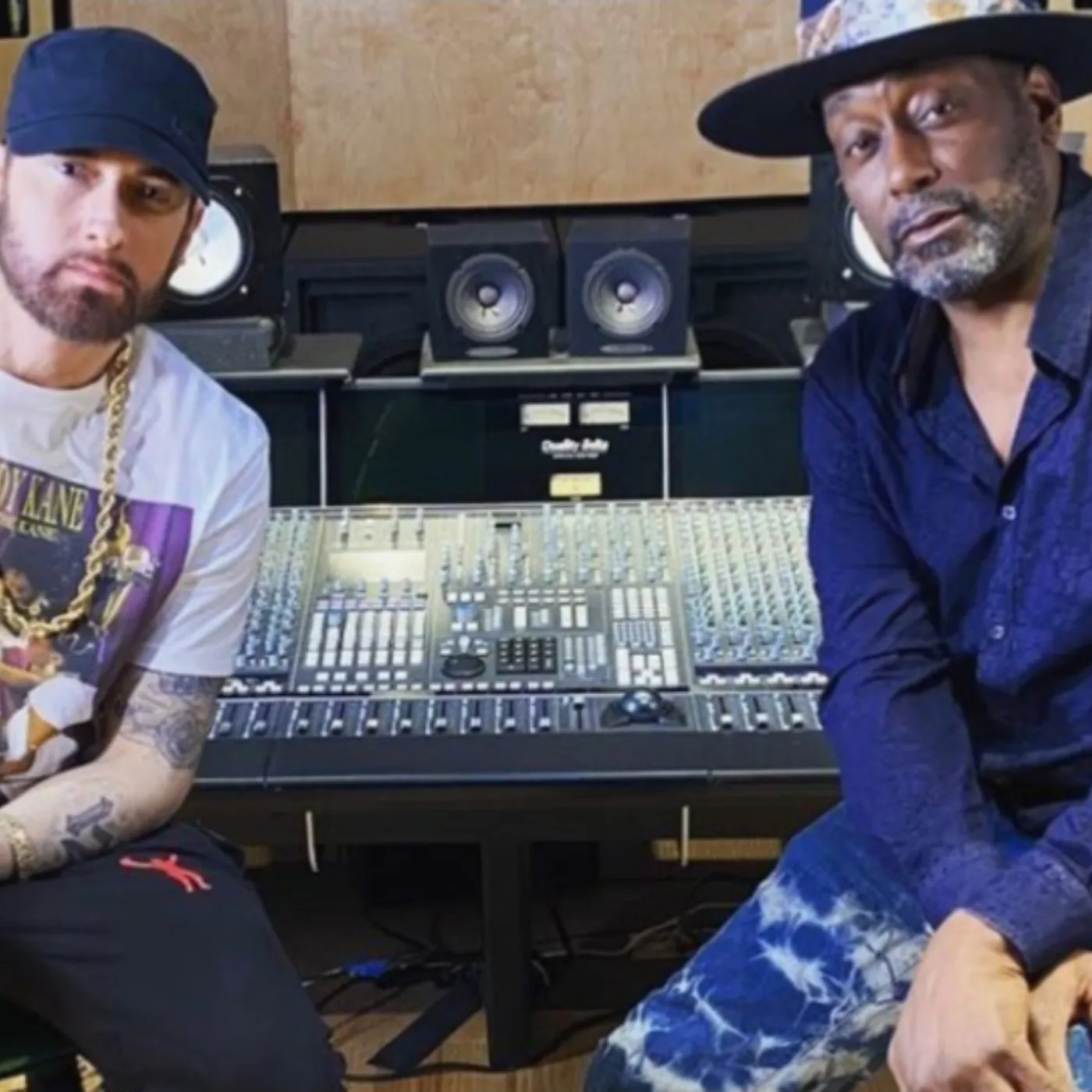

Big Daddy Kane Explains the One Thing Eminem Got Right That Others Never Did
Hip-hop has always been about more than just rhymes and beats—it’s about authenticity, storytelling, and cultural impact. Few artists embody this ethos as strongly as Eminem, who built a career by being brutally honest about his life, his struggles, and his environment. Recently, hip-hop legend Big Daddy Kane sat down with Shannon Sharpe on Club Shay Shay and offered deep insight into why Eminem’s career resonates so powerfully. According to Kane, Eminem’s dedication to the craft and his authenticity are what truly set him apart.
This article explores Big Daddy Kane’s perspective on Eminem, why authenticity matters in hip-hop, how Eminem’s honesty separates him from other rappers, and why Kane believes Em is one of the most respected MCs of all time.

Big Daddy Kane: A Hip-Hop Pioneer With Authority
Before diving into Kane’s comments about Eminem, it’s important to understand why his words carry such weight. Big Daddy Kane is a foundational figure in hip-hop, a rapper known for his razor-sharp lyricism, stage presence, and ability to merge style with substance. Emerging in the 1980s Golden Era of hip-hop, Kane influenced generations of MCs who came after him.
With over four decades in the game, Kane has witnessed firsthand the evolution of hip-hop culture. From the rise of East Coast rap to the dominance of modern-day superstars, his perspective is shaped by both history and experience. That’s why when Kane praises Eminem, it’s not just casual flattery—it’s recognition from a certified legend.
Eminem: A Student of the Game
One of the first things Big Daddy Kane pointed out was Eminem’s dedication to studying hip-hop. According to Kane, Eminem is not just an artist who raps; he’s a student of the game who pays attention to every detail of the craft.
Kane recalled how Eminem once pointed out a stylistic nuance in Kane’s rapping that even Kane himself had never noticed. That moment convinced him of Eminem’s deep understanding of hip-hop as an art form. “He’s that deep in it,” Kane said, highlighting how seriously Em takes the culture.
Being a student of hip-hop means more than just memorizing lyrics or copying flows—it means respecting the roots, understanding the pioneers, and constantly evolving. Eminem’s extensive knowledge of rap history, from Kool G Rap to Rakim, shows he didn’t just arrive in the industry by chance; he studied the masters and worked relentlessly to perfect his craft.
Why Eminem’s Authenticity Matters
Beyond technical skill, Big Daddy Kane emphasized authenticity as the core of Eminem’s success. In hip-hop, credibility is everything. Fans connect with rappers not just for their talent, but for their ability to tell real stories that reflect their lives and environments.
Kane compared Eminem’s approach to that of legendary rap groups like N.W.A. and the Geto Boys. Just as N.W.A. gave the world a raw, unfiltered look at life in Compton, and the Geto Boys offered vivid depictions of Houston’s streets, Eminem did the same for his world: Detroit’s trailer parks and 8 Mile Road.
What stood out to Kane was how Eminem never pretended to be something he wasn’t. Instead of trying to adopt the imagery of inner-city projects, Em painted a vivid picture of white working-class struggles—a world that many outside his community knew little about. Kane admired this, saying:
“Eminem talked about his hood, talked about 8 Mile, but he was not talking about the projects in Detroit. He’s talking about trailer park stuff. He’s talking about white hood stuff. I thought that was just so dope. Because this is white ghetto stuff that we’re learning about now.”
This honesty gave Eminem credibility. He didn’t need to fabricate stories to fit into hip-hop; he brought his own reality into the culture, expanding the lens through which hip-hop stories are told.
The Difference Between Eminem and Vanilla Ice
When asked about the difference between Eminem and Vanilla Ice, Kane’s answer was straightforward: authenticity. While Vanilla Ice achieved enormous commercial success with hits like “Ice Ice Baby,” his image and stories often lacked the genuine connection that hip-hop fans demand. His credibility in the culture was questioned, and ultimately, it limited his long-term impact.
Eminem, by contrast, built his empire on truthful storytelling. From tracks like “The Way I Am” to “Lose Yourself”, his music is filled with raw reflections of his reality—poverty, addiction, family struggles, and the pressure of fame. This vulnerability resonated with audiences because it was real. Kane explained that this was “what Eminem got right” that Vanilla Ice didn’t.
In hip-hop, where identity and truth are cornerstones, Eminem’s willingness to show who he really was gave him the credibility that his predecessors lacked.
Eminem’s Impact on Hip-Hop Culture
Big Daddy Kane’s respect for Eminem goes beyond personal admiration—it reflects Eminem’s undeniable influence on hip-hop culture. Eminem shattered barriers as one of the most successful rappers of all time, becoming the best-selling hip-hop artist in history. His success didn’t come from gimmicks; it came from connecting with people across cultures and backgrounds through honest storytelling.
Eminem’s influence extends to multiple dimensions:
Lyrical Mastery: His complex rhyme schemes and multi-syllabic flows set new standards for technical excellence.
Cultural Expansion: He opened the door for fans who may not have otherwise engaged with hip-hop, expanding the genre’s global reach.
Honesty and Vulnerability: By discussing issues like depression, addiction, and personal failures, he normalized vulnerability in rap—a genre once dominated by bravado.
Respect from Legends: Figures like Dr. Dre, Snoop Dogg, Nas, Jay-Z, and now Big Daddy Kane have all acknowledged Eminem’s place among the greats.
These factors cement his legacy as not just a rapper, but a cultural icon whose work will be studied for decades.
Why Honesty Is the Core of Great Hip-Hop
Big Daddy Kane’s analysis of Eminem underscores a larger truth about hip-hop: honesty is the ultimate currency. Fans can spot inauthenticity from miles away, and in a genre built on lived experiences, only real stories resonate.
The greatest MCs—from Tupac Shakur to The Notorious B.I.G., from Nas to Jay-Z—built their legacies on telling authentic stories about their lives. Eminem belongs in that lineage because he did the same, but from his own unique perspective. He didn’t try to imitate; he innovated by sharing his own struggles.
As Kane noted, Eminem taught listeners something new: the reality of growing up in a poor, predominantly white community in Detroit. This broadened the scope of hip-hop storytelling, proving that the genre is not confined to one type of experience but is instead a universal platform for truth.
Big Daddy Kane’s Respect for Eminem
Perhaps the most powerful part of Kane’s comments was the sheer respect he expressed for Eminem. Respect in hip-hop is not given lightly; it is earned through skill, consistency, and authenticity.
Kane praised Eminem not just for his talent, but for his honesty, his humility, and his deep commitment to hip-hop culture. Coming from a pioneer who helped shape the very foundation of the genre, this recognition speaks volumes about Eminem’s place in history.
When Kane said, “I have a lot of respect for him,” it wasn’t just admiration—it was acknowledgment of Eminem’s role as a true MC, someone who embodies the principles that hip-hop was built on.
The Lasting Lesson: Be Real, Not Perfect
The conversation between Big Daddy Kane and Shannon Sharpe offers an important takeaway not just for hip-hop, but for life: authenticity outlasts gimmicks. Success without truth is temporary. Eminem’s career shows that being real—flaws and all—creates a legacy that endures.
Kane contrasted Eminem’s authenticity with Vanilla Ice’s manufactured image, illustrating why one is remembered as a cultural icon while the other is often seen as a novelty. In hip-hop, the story has to ring true. Eminem got that right from the beginning, and it’s why he remains one of the most respected MCs today.
Big Daddy Kane’s breakdown of Eminem’s success reveals a truth that extends beyond rap: authenticity is the foundation of respect. Eminem’s willingness to embrace his reality—poverty, hardship, and all—made him relatable and credible in a genre that values truth above all else.
From Kane’s perspective, Eminem is more than just a successful artist—he is a student of the game, a storyteller, and a cultural force who helped expand the scope of hip-hop. While other artists sought to imitate or fabricate, Eminem chose honesty, and that’s why his music continues to resonate across generations.
In the end, Kane summed it up perfectly: what Eminem got right is simply being himself. And in hip-hop, there’s nothing more powerful than that.



















